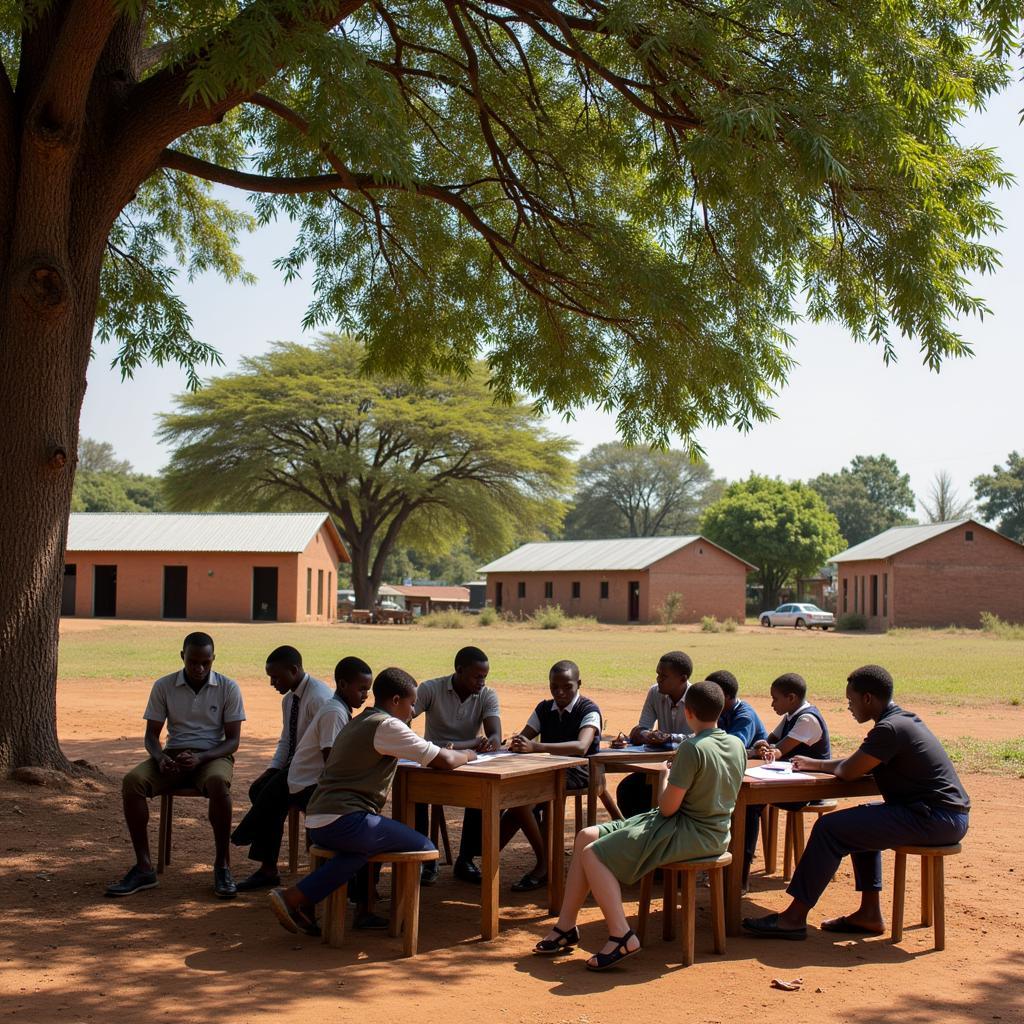African Boys Studying at Home: Challenges and Opportunities
The image of African Boys Studying At Home evokes a range of emotions and questions. It speaks to the universal desire for education, the challenges faced in resource-constrained environments, and the resilience of communities determined to empower their youth. For many African boys, the home serves as a primary learning space, shaping their academic journeys and future prospects.
The Evolving Landscape of Education in Africa
Africa’s education landscape is as diverse as the continent itself. While some countries boast well-established education systems, others grapple with limited infrastructure, inadequate resources, and socioeconomic disparities that hinder access to quality education. In this context, the home often becomes an extension of the classroom, a place where learning continues beyond the confines of formal schooling.
 Three African boys studying together under a tree, with books and notebooks spread out around them
Three African boys studying together under a tree, with books and notebooks spread out around them
Factors Influencing Home Learning for African Boys
Several factors influence the prevalence and effectiveness of home learning for African boys. These include:
- Socioeconomic Background: Poverty often necessitates children, including boys, to contribute to household income, limiting their time for studies.
- Cultural Norms: In some cultures, boys are expected to engage in activities deemed more “masculine,” such as farming or herding, potentially impacting their educational pursuits.
- Geographic Location: Remote and rural communities often lack access to schools and educational resources, making home learning a necessity rather than a choice.
- Availability of Technology: Limited access to electricity, internet connectivity, and digital devices creates a digital divide that can hinder effective home learning.
The Role of Family and Community in Supporting Home-Based Education
Despite the challenges, families and communities play a crucial role in supporting the education of African boys, even within the home environment. Parents and guardians often provide guidance, encouragement, and even serve as informal educators, sharing their knowledge and skills.
“Education is the most powerful weapon which you can use to change the world,” said Nelson Mandela, highlighting its transformative potential. This belief resonates deeply within African communities, where education is viewed as a pathway to a brighter future.
 A family sitting together in their home, with the children reading books and the parents providing guidance
A family sitting together in their home, with the children reading books and the parents providing guidance
Overcoming Obstacles and Creating Opportunities
Addressing the challenges faced by African boys studying at home requires a multifaceted approach:
- Investing in Infrastructure: Expanding access to schools, particularly in rural areas, is essential to providing quality education for all.
- Empowering Teachers: Training teachers to effectively engage students in diverse learning environments, including homes, is crucial.
- Leveraging Technology: Exploring innovative ways to utilize technology, such as mobile learning platforms, can bridge the digital divide and enhance home-based learning experiences.
- Promoting Gender Equality: Challenging cultural norms that limit educational opportunities for boys and encouraging their active participation in all aspects of learning is essential.
Conclusion
African boys studying at home represent both a challenge and an opportunity. By acknowledging the obstacles they face and implementing sustainable solutions, we can unlock their potential and pave the way for a brighter future for generations to come. Supporting their educational journeys requires a collective effort from governments, communities, and individuals committed to fostering a love for learning that extends beyond the walls of a traditional classroom.



